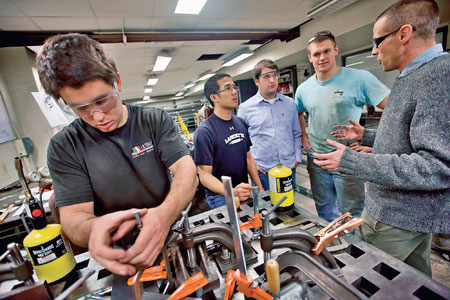Building on Success
Traditionally strong as problem-solvers, engineers are now also problem-finders. The increasingly interconnected global world demands that engineers not only have an excellent technical skill-set, but also mastery of a broader range of skills. Engineers are called upon as never before to have a deep understanding and appreciation of the scientific, social, artistic, and humanistic aspects of engineering and the world in which they live.
Lafayette is responding to these evolving needs. “Our vision is to provide engineering students not only with an outstanding technical education but also with opportunities to pursue innovative collaborations with faculty and students from all disciplines at the College,” says Scott Hummel, Interim Jeffers Director of the Engineering Division.
Hummel is very clear on the main reason why: “We are teaching our students to be innovators and leaders.

Members of the steel bridge team, advised by Steve Kurtz (far right), associate professor of civil and environmental engineering, work on their design in the structural lab.
“The technical elements of their degree are critical, but so are other skills—being able to work in and lead a cross-functional team, having an understanding and appreciation of perspectives beyond the technical,” he says. “The disciplines are important, but when they are combined with leadership, innovation, and broad perspective, the education we provide creates endless opportunities for our students. These abilities are transferable and will serve our students from their entry-level position to the CEO’s office.”
The data support Hummel’s vision for engineering as Lafayette is ranked No. 6 among its peers in the percentage of alumni who are executives or directors of companies with sales of $1 million or more as listed in the 2012 Standard & Poor’s Register.
Another reason for emphasizing an engineering education that goes beyond the purely technical is the challenge graduates face in competing in a global marketplace.
“North American engineering schools don’t have an advantage over their overseas counterparts in educating students in the fundamentals of engineering. After all, thermodynamics is the same here as on the other side of the globe,” Hummel says. “But our engineering graduates expect to earn up to five times more than their counterparts from India and China.”
Graduates from North American engineering schools command salaries five times that of their foreign counterparts, which is due to much more than technical expertise. Technical expertise can be had worldwide at a fraction of the cost.
“Companies can email technical and computational problems across the globe to be solved and have the solution the next morning,” Hummel says and makes his key point again: “Employers want students who can innovate and lead. Our students are looking at the broad issues and implication of engineering, not just the technical aspects. They get hired as innovators, and that’s why we have so many grads in such high places.”
To ensure that Lafayette provides engineering students with the best possible education, the engineering faculty is implementing initiatives, with the encouragement of Provost Wendy Hill, that emerged from the work of faculty study groups and from an engineering division retreat following an external review of engineering programs in spring 2011. Chaired by the vice president for research at University of Vermont who previously founded the Smith College engineering program, the review team also included the vice provost of University of California- Berkeley; the dean of engineering at Dartmouth College; and the retired executive vice president for innovation and technology of IBM.
The goals of the engineering division center on two key thrusts.
- Integrating engineering and the liberal arts programs through multidisciplinary curricular initiatives. Increasing multidisciplinary opportunities for engineering students will be accomplished through a proposed new center that will serve as a hub for initiatives in entrepreneurship and leadership. The center will house projects that focus on innovation and range from design to research and development. Hummel emphasizes that “the center is not an engineering initiative, it’s a College initiative.” The center will bring together students and faculty from all programs at the College. Although engineering is an essential element of the center, projects within the center are not limited to those that include engineering students and faculty. Estimates are that one-third of the student body will be involved and may reach 50 percent once the center is fully established.
- Adding curricular flexibility to allow students to explore other fields, both within and outside of engineering. The current curriculum allows engineering students to take up to 22 percent of their courses outside of the STEM disciplines (science, technology, engineering, and math). This is restrictive as compared to many programs at both Lafayette’s peer institutions and at Ph.D.-granting institutions. The change will allow students to take up to one-third of their courses in the liberal arts, but will not require them to do so.
The changes are aligned with the long-standing traditions and mission of the College. Lafayette engineers have always been regarded in industry, business, research, and graduate schools as technically competent and as well-rounded innovators. The changes will ensure this reputation for the future.